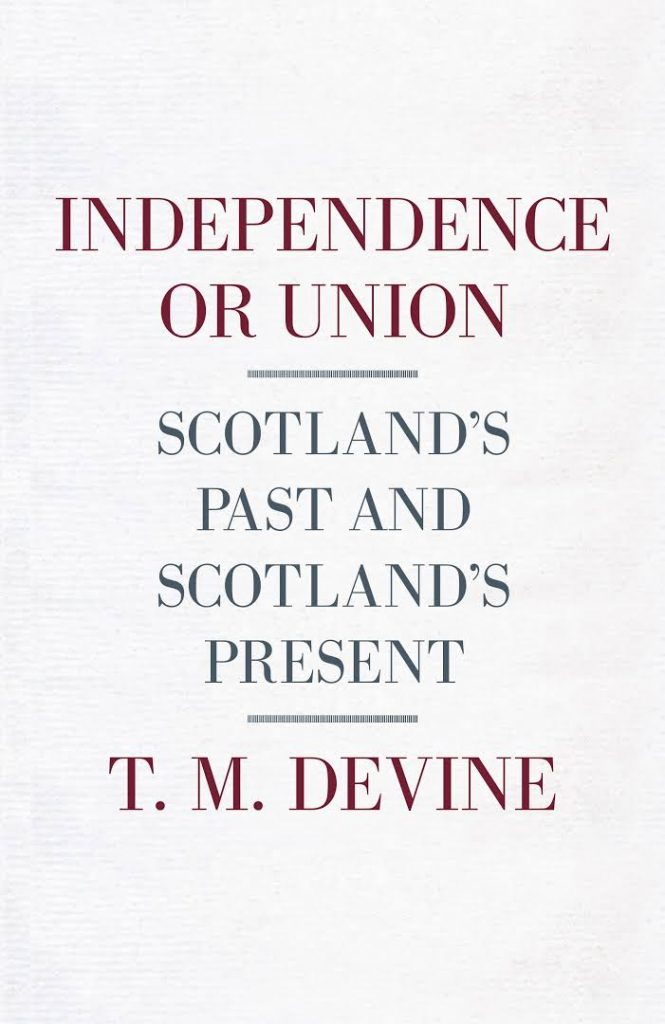Warning: Undefined array key "ssba_bar_buttons" in /usr/home/movgwifi/public_html/yesedinburghwest.info/wp-content/plugins/simple-share-buttons-adder/php/class-buttons.php on line 602
Warning: Undefined array key "ssba_bar_buttons" in /usr/home/movgwifi/public_html/yesedinburghwest.info/wp-content/plugins/simple-share-buttons-adder/php/class-buttons.php on line 602
Warning: Undefined array key "ssba_bar_buttons" in /usr/home/movgwifi/public_html/yesedinburghwest.info/wp-content/plugins/simple-share-buttons-adder/php/class-buttons.php on line 602
 Please buy the book here. See review by Alan Taylor.
Please buy the book here. See review by Alan Taylor.
This book explores the relationship between Scotland and England in all its ambiguity. When not undermining each other with invading armies, both Scotland and England have broadly benefitted from each other’s presence – indeed for long periods of time nobody questioned the union which joined them. But as Devine makes clear, it has for the most part been a relationship based on consent, not force, on mutual advantage, rather than antagonism – and it has always held the possibility of a political parting of the ways. With the United Kingdom under a level of scrutiny unmatched since the 18th century, this is an essential guide.
Independence or Union may be read as a synthesis of sorts of Devine’s own indispensable trilogy which began with The Scottish Nation and was followed by Scotland’s Empire and To the Ends of the Earth. It covers the same period, from 1700 to the dawning of the 21st century, and much of the same ground. What it offers in addition is concision, clarity, perspective and updating. This is a book that owes a considerable debt to recent historiography to which Devine himself has contributed hugely. For whereas in previous generations what little we knew of our history was based more on myth and prejudice than forensic scholarship, today we have an embarrassment of riches.
At the book’s core is the Union’s formation. That this breathtaking episode is still a cause for fierce debate demonstrates its enduring relevance. The reasons why there was a merger between England and Scotland are complex and involve politics, trade and religion. Blackmail, too, played its part, as did bribery, or “patronage” as it is called by the weasel-worded.
The disastrous Darien venture in the final years of the 17th century had emptied wealthy Scots’ coffers and successive harvests had failed, throwing the country into crisis. Yet with the exception of a few grandees with vested interests there was amongst the general population no enthusiasm for union. Public opposition focussed largely on the Kirk, which “feared the contamination of Anglican influence”. But when an act was passed guaranteeing the Kirk’s rights, those in the pulpit who had been so vocal fell suddenly silent. Subsequently, the Act of Union was passed by a majority of 110 votes to 67. Thus a parcel of self-serving rogues sold Scotland’s independence for a few groats.
Over the centuries, love in Scotland for the United Kingdom has troughed and peaked and troughed again. This was – and by and large remains – truly a marriage of convenience. In 1713, Daniel Defoe acknowledged: “not 1 man in 15” in Scotland was in favour of the Union. By 1745, the second Jacobite Rising produced the opposite result to that intended, binding lowland Scotland, which was opposed to the rebelling Stuarts, ever closer to England.
The rise of the British Empire further cemented the alliance. Many Scots prospered in the colonies and on their return built substantial estates and mansions and embraced the craze for ‘improvement’. The literati of the Enlightenment were virtually to a man in favour of the Union and Scots merchants took every advantage offered by their country’s association with its Auld Enemy. “By the early 19th century,” Devine writes, “unionism…seemed everywhere triumphant. The public buildings and streets of the new townscapes recorded names, memorial and statues commemorating British union, British empire, British heroes and British wars.” It was not until late into the 20th century that nationalism began to be a factor. In part, Devine argues, this was because when Labour was in power it had canny operators, such as Willie Ross and Tom Johnston, who were adept at persuading the Treasury to finance major projects, including the provision of hydroelectric power in the Highlands.
What changed the fragile dynamic between north and south was the advent of Margaret Thatcher and her strident brand of Toryism. The miners’ strike, the Poll Tax, the closure of Ravenscraig, and her bellicose, antipathetical rhetoric angered many Scots and gave them a target at which to direct their discontent.
Yes Edinburgh West has a website, Facebook, Twitter, National Yes Registry and a Library of topics on Scottish Politics, including Independence.



